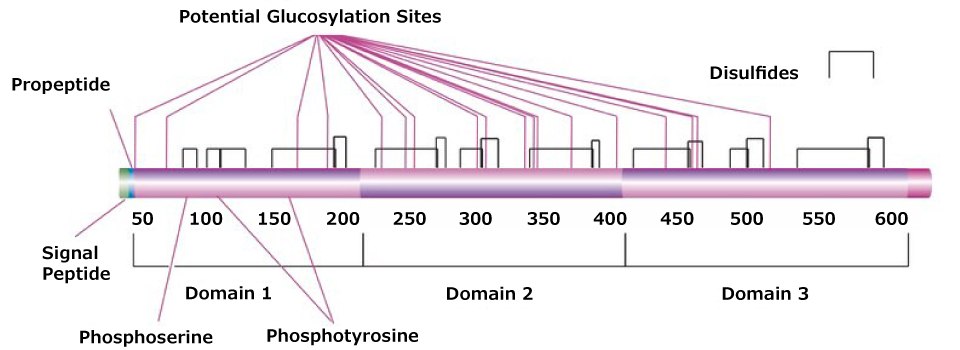Human Serum Albumin (HSA)
What is Human Serum Albumin (HSA)?
Human Serum Albumin (HSA) is a supplement that can be added to cell culture media and helps provide the essential nutrients, proteins, and hormones required for optimal cell growth. It is also commonly used as an antioxidant, to sequester toxins, and for the transportation of bioactive ligands.
HSA displays an extraordinary ligand binding capacity, acting as a carrier for many endogenous and exogenous compounds, such as fatty acids. It also affects the pharmacokinetics of many drugs, modifying some ligands during metabolism and rendering potential toxins harmless. HSA accounts for the majority of human plasma’s antioxidant capacity1.

Figure 1.Human Serum Albumin protein structure.
Human Serum Albumin Applications
HSA is used in general cell culture and stem cell culture applications. In stem cell cultures, it helps promote the reproducible differentiation of human embryonic stem cells2 and promotes mouse embryo culture growth3. HSA also plays a role in vaccine formulation, diagnostics, cell culture, and bioprocessing. It functions as a stabilizing agent in bioprocessing and production of biopharmaceuticals, enhances drug and gene delivery, and can serve as an imaging agent.
Human Serum Albumins Products
What is Recombinant Human Serum Albumin?
Recombinant human serum albumin (rHSA) matches the structure and function of HSA, but is obtained from sources such as Pichia pastoris, S. cerevisiae, E. coli, and plants. Researchers have worked diligently over the last few decades to create recombinant variants of HSA that exhibit a consistent and high-quality profile. Recombinant HSA from heterologous sources have proven to be most beneficial for biotechnological purposes.
rHSA is naturally free of bovine spongiform encephalopathy and other transmissible spongiform encephalopathy agents. Therefore, it carries less of a potential risk from damaging mammalian adventitious agents when compared to other serum-derived components.
Recombinant Human Serum Albumin Applications
rHSA has many applications in addition to use as a supplement in growth media for cell culture applications, including:
- Cell Culture: rHSA supports cell growth by providing essential nutrients and acting as a carrier for hormones and growth factors when used as a tissue culture media supplement.
- Biopharmaceuticals and Medical Devices: rHSA aids in the formulation of several biopharmaceutical products, including vaccines, monoclonal antibodies, and other therapeutic proteins. It helps improve the efficacy, solubility, and shelf life of therapeutics. rHSA is also used in the manufacture medical tools such as wound dressings. Because of its biocompatibility and binding properties, rHSA is used in various medical applications.
- Gene and Drug Delivery: rHSA can complex with genetic material and protect it during delivery to target cells, so it holds potential to be used as a carrier in gene therapy applications gene delivery systems. Albumin-based nanoparticles drug delivery systems have the potential to improve drug solubility, extend circulation time, and enhance targeting to specific tissues, improving therapeutic outcomes.
- Regenerative Medicine and Tissue Engineering: Recombinant albumin plays a role in tissue engineering and regenerative medicine, as it can be incorporated into scaffolds or matrices to enhance cell attachment, proliferation, and tissue regeneration.
Recombinant Human Serum Albumins Products
References
To continue reading please sign in or create an account.
Don't Have An Account?